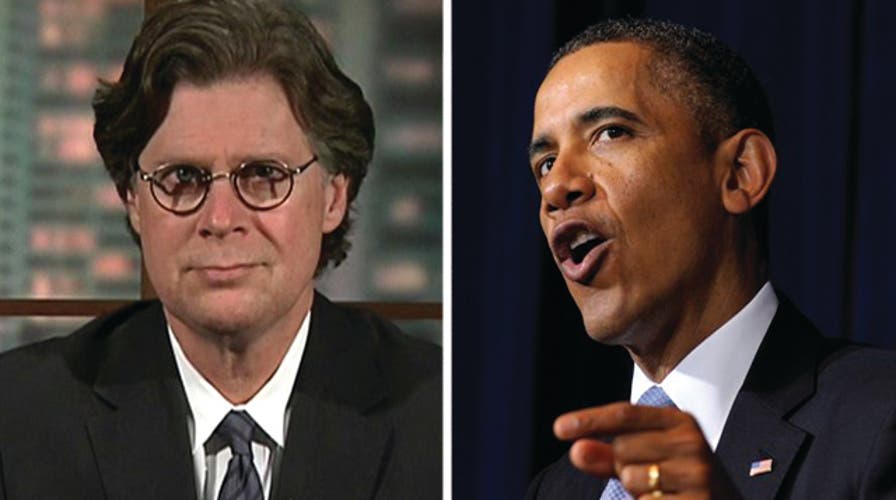Obama resists simple fixes in sequester?
Pres. Obama could fix many of the problems in the sequester easily and quickly, but some believe he doesn't want to
This is a rush transcript from "On the Record," March 8, 2013. This copy may not be in its final form and may be updated.
GRETA VAN SUSTEREN, FOX NEWS HOST: Tonight, there's new evidence that the Obama administration is trying to make the sequester as painful as possible, a whistleblower U.S. park ranger telling FOXNEWS.com that the Park Service supervisors nixed plans to minimize the impact of the cuts on park visitors. Instead, the ranger says, park staff were told to cancel special events and cut services like talks and tours.
Washington Examiner Chief Political Correspondent Byron York joins us. Good evening, Byron. And Byron, can you tell me a little more about what this -- what the park rangers were attempting to do, or at least the memo, as we understand it?
BYRON YORK, WASHINGTON EXAMINER: Well, they were trying -- they were suggesting that there were ways that they could cut the Park Service budget without actually affecting visitors, and so that it would not, you know, shorten closing -- opening hours or have fewer guides, or that sort of thing. And according to this one Park Service employee, they were told, Nope, that's -- you know, we're going to make this -- these cuts very visible and that people feel it.
It kind of comports with another e-mail we heard of earlier this week from the Agriculture Department in which another employee tried to come up with ways to enact the cuts so it would be less disruptive, less painful, and they were told, No, we've got to stay in line with the official line of the administration.
VAN SUSTEREN: Well, it's sort of interesting. The -- it's from the director, Jonathan Jarvis, apparently, is who wrote this memo. Now, what we don't know is, you know -- you know, whether a command came from farther up the chain or whatever it is. But you know -- you know, we don't know, and it's simply a whistleblower. Is there any sort of innocent explanation for what this director was saying, for the National Park Service?
YORK: Well, there's a differing of opinion, you know, inside the executive branch, as well as certainly with Congress, about how disruptive these cuts actually have to be. There's a significant disagreement about whether they really need to touch the public that much, whether there is enough waste or enough inessential spending in a lot of these agencies that it could be cut without a terrible effect on the public. So yes, there's a substantial disagreement inside the government about this.
VAN SUSTEREN: All right, now, you've also written an article, talking about the -- that says, in part, the little secret of sequestration is the Obama administration could fix much of the problem very quickly, but it doesn't want to. First, how could it fix it quickly? And why do you think that it doesn't want to?
YORK: Well, we've heard a lot complaints from cabinet officers and other people in the Obama administration saying these cuts require across- the-board cuts that are going to cut everything and it's going to hurt everybody.
And the fact is, Congress actually tells the executive branch agencies how much money they can spend and how they should spend it. Sometimes the instructions are broad, sometimes they're very detailed, and the executive branch has to follow those instructions.
But if you have a situation where a cabinet agency wants to spend money in a different way than Congress directed, there's a way to do that. You ask Congress permission. Congress gives you the permission, and then the money can be spent differently.
In the past week or two, Republicans in Congress have been begging members of the Obama administration, Please, if you think these cuts are going to be very disruptive and painful, come to us with your suggestions for making these cuts in a different way. We will work with you. Please come ask us.
Darrell Issa, the chairman of the Government Oversight Committee in the House, sent out a letter to all the cabinet agencies on February 28th. He has not received a single response yet.
VAN SUSTEREN: All right, is it routine to ask -- for these agencies to ask Congress for a different way to spend the money so that you would expect the secretaries would be aware of this possibility?
YORK: Absolutely. It's called reprogramming. It's done a lot, and it's up to the discretion of Congress. But the officials do not have a huge amount of flexibility in how they can spend Congress, if Congress has specifically instructed them to spend this money on this, or this money on that. But they can always go back to Congress and say, We need to do this differently.
And in this case, with an obvious unique case of sequestration, lawmakers have been practically begging them to come do it. You can make this easier. It doesn't have to be so hard. We'll give you permission. And they haven't gotten any response from the administration.
VAN SUSTEREN: Well, the letter went out on February 28th. Maybe when they feel a little bit more of the pinch, they'll come back to Congress. But so far, nobody has come back to Congress for that flexibility.
Byron, thank you. At least as far as we know...
YORK: Thank you, Greta.
VAN SUSTEREN: ... I should add.

